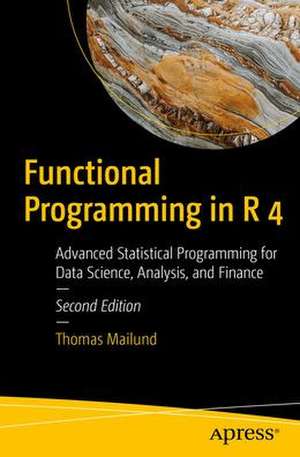Functional Programming in R 4: Advanced Statistical Programming for Data Science, Analysis, and Finance
Autor Thomas Mailunden Limba Engleză Paperback – 9 iun 2023
Master functions and discover how to write functional programs in R. In this book, updated for R 4, you'll learn to make your functions pure by avoiding side effects, write functions that manipulate other functions, and construct complex functions using simpler functions as building blocks.
In Functional Programming in R 4, you’ll see how to replace loops, which can have side-effects, with recursive functions that can more easily avoid them. In addition, the book covers why you shouldn't use recursion when loops are more efficient and how you can get the best of both worlds.
Functional programming is a style of programming, like object-oriented programming, but one that focuses on data transformations and calculations rather than objects and state. Where in object-oriented programming you model your programs by describing which states an object can be in and how methods will reveal or modify that state, in functional programming you model programs by describing how functions translate input data to output data. Functions themselves are considered to be data you can manipulate and much of the strength of functional programming comes from manipulating functions; that is, building more complex functions by combining simpler functions.
What You'll Learn
- Write functions in R 4, including infix operators and replacement functions
- Create higher order functions
- Pass functions to other functions and start using functions as data you can manipulate
- Use Filer, Map and Reduce functions to express the intent behind code clearly and safely
- Build new functions from existing functions without necessarily writing any new functions, using point-free programming
- Create functions that carry data along with them
Who This Book Is For
Those with at least some experience with programming in R.
Preț: 327.15 lei
Preț vechi: 408.93 lei
-20% Nou
Puncte Express: 491
Preț estimativ în valută:
62.61€ • 64.68$ • 52.11£
62.61€ • 64.68$ • 52.11£
Carte tipărită la comandă
Livrare economică 26 martie-09 aprilie
Preluare comenzi: 021 569.72.76
Specificații
ISBN-13: 9781484294864
ISBN-10: 1484294866
Ilustrații: XI, 158 p. 17 illus.
Dimensiuni: 155 x 235 mm
Greutate: 0.27 kg
Ediția:2nd ed.
Editura: Apress
Colecția Apress
Locul publicării:Berkeley, CA, United States
ISBN-10: 1484294866
Ilustrații: XI, 158 p. 17 illus.
Dimensiuni: 155 x 235 mm
Greutate: 0.27 kg
Ediția:2nd ed.
Editura: Apress
Colecția Apress
Locul publicării:Berkeley, CA, United States
Cuprins
Chapter 1 Introduction
Chapter 2 Functions in R
Chapter 3 Pure Functional Programming
Chapter 4 Scope and Closures
Chapter 5 Higher-order Functions
Chapter 6 Filter, Map, and Reduce
Chapter 7 Point-free ProgrammingChapter 8 Conclusions
Notă biografică
Thomas Mailund is Senior Software Architect at Kvantify, a quantum computing company from Denmark. He has a background in math and computer science. He now works on developing algorithms for computational problems applicable for quantum computing. He previously worked at the Bioinformatics Research Centre, Aarhus University, on genetics and evolutionary studies, particularly comparative genomics, speciation, and gene flow between emerging species. He has published Beginning Data Science in R with Apress, as well as other books out there.
Textul de pe ultima copertă
Master functions and discover how to write functional programs in R. In this book, updated for R 4, you'll learn to make your functions pure by avoiding side effects, write functions that manipulate other functions, and construct complex functions using simpler functions as building blocks.
In Functional Programming in R 4, you’ll see how to replace loops, which can have side-effects, with recursive functions that can more easily avoid them. In addition, the book covers why you shouldn't use recursion when loops are more efficient and how you can get the best of both worlds.
Functional programming is a style of programming, like object-oriented programming, but one that focuses on data transformations and calculations rather than objects and state. Where in object-oriented programming you model your programs by describing which states an object can be in and how methods will reveal or modify that state, in functional programming you model programs by describing how functions translate input data to output data. Functions themselves are considered to be data you can manipulate and much of the strength of functional programming comes from manipulating functions; that is, building more complex functions by combining simpler functions.
You will:
- Write functions in R 4, including infix operators and replacement functions
- Create higher order functions
- Pass functions to other functions and start using functions as data you can manipulate
- Use Filer, Map and Reduce functions to express the intent behind code clearly and safely
- Build new functions from existing functions without necessarily writing any new functions, using point-free programming
- Create functions that carry data along with them
Caracteristici
A unique book on learning and using functional programming in R Author is an expert at using and programming with R R is a popular open source programming language for statistical analysis and data science
